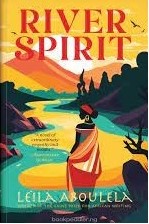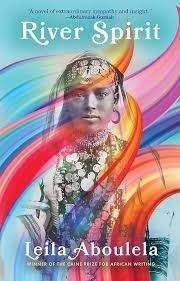River spirit, by Leila Aboulela
 The ASCL Library's literature collection focuses primarily on novels, poetry and other genres produced in Africa, and less on the literary output of African diaspora authors. Nevertheless, River Spirit, which was, with three different covers, published simultaneously in the UK, the US and Canada, is part of our collection. River Spirit is the most recent novel by the first-ever Caine Prize winner Leila Aboulela who, born to an Egyptian mother and a Sudanese father grew up in Khartoum and now lives in Aberdeen (Scotland).
The ASCL Library's literature collection focuses primarily on novels, poetry and other genres produced in Africa, and less on the literary output of African diaspora authors. Nevertheless, River Spirit, which was, with three different covers, published simultaneously in the UK, the US and Canada, is part of our collection. River Spirit is the most recent novel by the first-ever Caine Prize winner Leila Aboulela who, born to an Egyptian mother and a Sudanese father grew up in Khartoum and now lives in Aberdeen (Scotland).
19th Century Sudan
River Spirit is a historical novel set in the Sudan of the 1880s, during the final years of the Turco-Egyptian regime (1820-1885). It is a time when violent slave raids still take place, even if the slave trade is less overt than in the past, and when heavy taxes are imposed on the population. The novel focuses on the years 1881-1884: the years of the rise of the self-proclaimed Mahdi – the Islamic saviour – Muhammed Ahmed Abdalla in Sudan. This political-religious development affects the lives of all the characters in the novel.
Aboulela does not focus primarily on the historical events but writes from the perspective and the experiences of the characters in her novel: their thoughts and considerations, their views, reflections and memories. Among them are Akuany, who narrowly escapes slavery as a young girl, along with her little brother Bol, but is later enslaved anyway; Yaseen, a merchant, later a jurist educated at Al Azhar University in Cairo, who is sent out to find out whether Muhammed Ahmed Abdalla, is indeed the Mahdi, the “Expected One," or an impostor; Yaseen's mother Fatimah and Yaseen's educated wife Salha; and Musa, a young man who joins the Mahdi’s rebel movement. Then there is Robert, a Scot who is an engineer at the shipyard in Khartoum, but whose passion is painting and who is sensitive to the beauty of Khartoum and its people.
reflections and memories. Among them are Akuany, who narrowly escapes slavery as a young girl, along with her little brother Bol, but is later enslaved anyway; Yaseen, a merchant, later a jurist educated at Al Azhar University in Cairo, who is sent out to find out whether Muhammed Ahmed Abdalla, is indeed the Mahdi, the “Expected One," or an impostor; Yaseen's mother Fatimah and Yaseen's educated wife Salha; and Musa, a young man who joins the Mahdi’s rebel movement. Then there is Robert, a Scot who is an engineer at the shipyard in Khartoum, but whose passion is painting and who is sensitive to the beauty of Khartoum and its people.
Muslim perspectives
Through the lives of the characters, the novel outlines the time leading up to the January 1885 death of British army officer and administrator Charles Gordon and the capture of Khartoum by the Mahdist forces. But what is especially interesting is that Aboulela takes the reader, through her characters, into Sudanese ways of thinking, Sudanese values and Sudanese (religious) considerations. The Muslim faith is very important in all of Aboulela's work.
In a 2021 interview Aboulela says about this: “As a Muslim reading English literature I find that it is infused with Christianity, and I see that and maybe the Christian reader might take it for granted, but for me it really stands out and so I want to put that [the Muslim faith] in my writing as being part of the stories I am telling and the characters that I am telling.”
 War in Sudan
War in Sudan
River Spirit was published in March this year, a month and a half before the start, on 15 April, of the terrible army-versus-paramilitary forces war that has devastated large parts of Khartoum and the adjacent cities of Omdurman and Bahri (bombings are still continuing). According to today’s (7 December 2023) UN figures, the war has so far claimed the lives of more than 12,190 people and made 6.6 million Sudanese flee their homes. UNHCR warned a month ago that in Darfur, after 20 years, another terrible tragedy of ethnic cleansing is unfolding.
Heleen Smits

